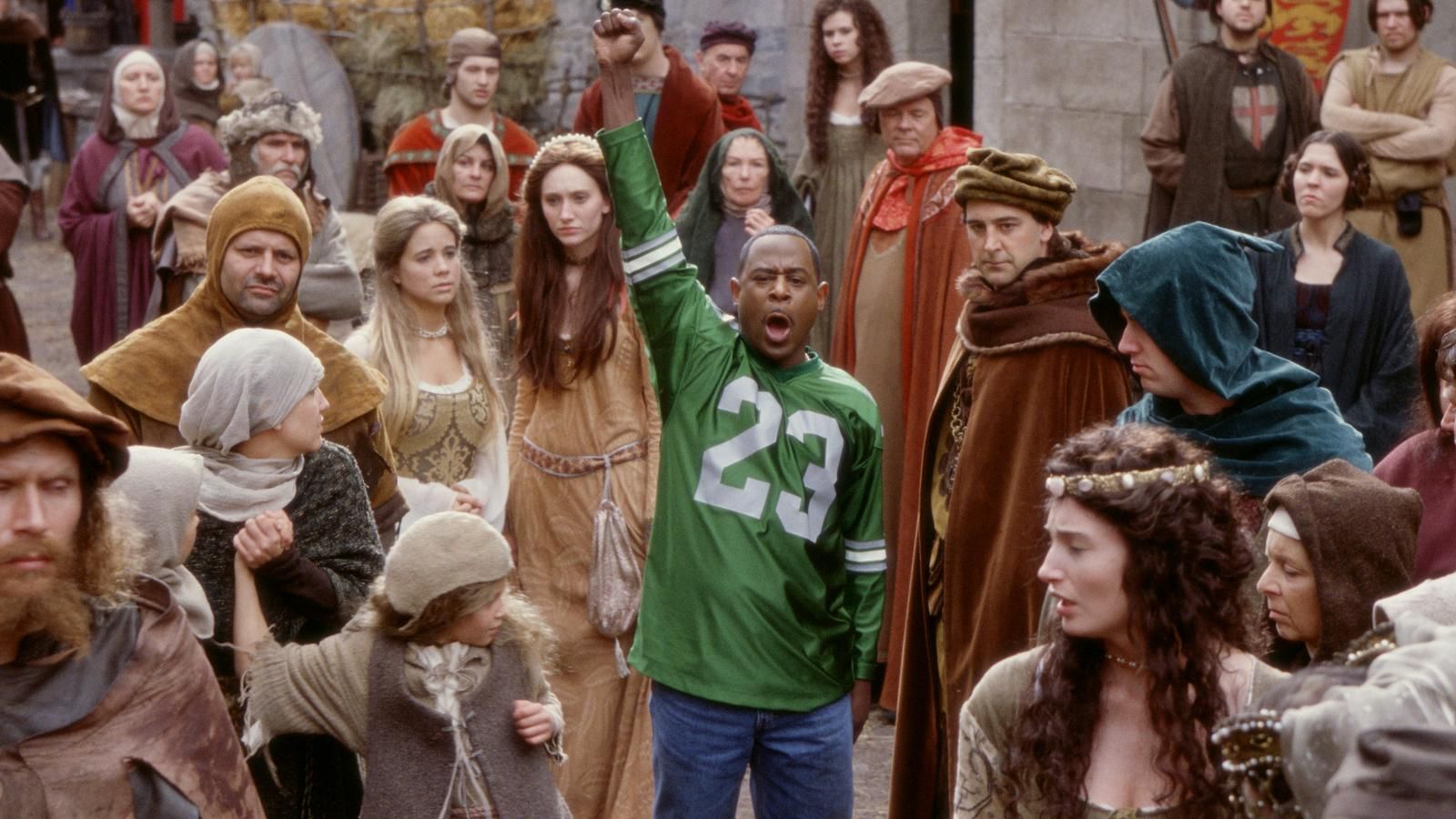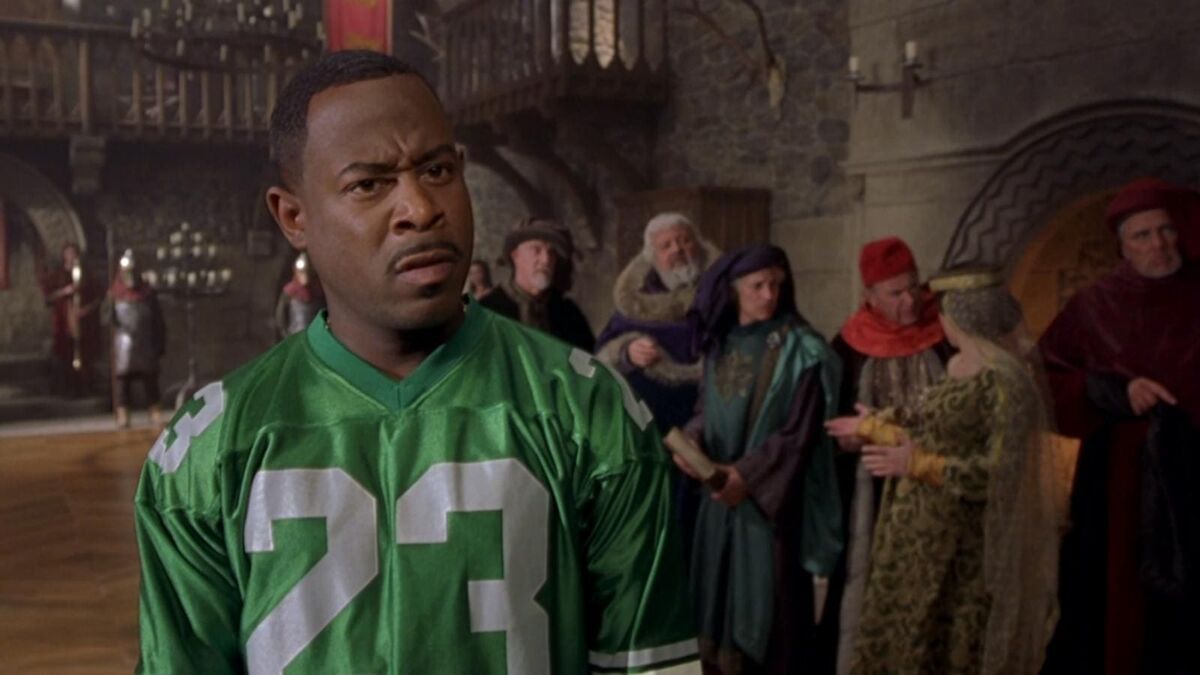Martin Lawrence’s Black Knight deserves a second life as isekai

What do Army of Darkness and Space Jam have in common? Aside from both being ‘90s movies, not much, you might think. However, it turns out that the two films are both part of a popular genre you might not be familiar with: the modern-day isekai.
Isekai, a Japanese term meaning “different world,” is a popular subgenre in anime, manga, light novels, and games. It’s defined as any story where the protagonist is transported, reincarnated, or trapped in a new realm — often a fantasy land, video game world, or alternate reality.
Once you know to look for it, you’ll see examples of isekai everywhere. And while traditionally, the term doesn’t apply to live-action movies or TV shows, it’s still an interesting way to categorize your favorite stories. I can’t claim credit for this idea. I got it from a tongue-in-cheek post on X demanding the return of live-action isekai like Army of Darkness (1992) and Space Jam (1996), two films that, sure enough, see Bruce Campbell and Michael Jordan, respectively, transported to other worlds.
But neither of those examples stuck out to me more than Martin Lawrence’s 2001 movie Black Knight, a largely forgotten time-travel movie that just so happens to be streaming on Prime Video and Hulu as of Aug. 1.
It’s no secret that I’m a fan of obscure, if not somewhat terrible, movies nobody knows about, but Black Knight is different – and not just because I’m a diehard Martin Lawrence fan. The comedy follows Jamal Walker (Lawrence), a fast-talking employee at a run-down medieval theme park, who is knocked into a moat and mysteriously transported to 14th-century England.
Mistaken for a messenger from Normandy, he gets caught up in a rebellion against a corrupt king. Using his modern street smarts (and a lot of pop-culture references), Jamal helps the locals fight for freedom while trying to figure out how to get back home. This sounds exactly like Inuyasha, except instead of demons, schoolgirls, and Japan, it’s Medieval times with a lot more Black representation.
Black Knight arrived at the height of Martin Lawrence’s career, in an era when cable TV reigned and audiences often discovered films through frequent reruns (or old VHS tapes). My persevering love for Lawrence was at its peak around this time. His syndicated, self-titled sitcom went off the air a few years earlier, in 1997, and he was in the middle of a formidable theatrical run that included films like A Thin Line Between Love and Hate (1996), Life (1999), and Big Momma’s House (2000). Even if those movies weren’t all huge at the box office or a hit with critics, Lawrence could do no wrong according to his fanbase at this time, who heralded him as the decade’s defining comedian.
Black Knight admittedly isn’t the most polished movie in the world, but Lawrence’s comedy chops carry it as he explores Medieval times through a Black perspective (something I’ve never seen reexamined since, no matter how many Black actors get cast in House of the Dragon or Lord of the Rings: The Rings of Power). It makes for some hilarious, fish-out-of-water moments that audiences of similar ethnic backgrounds can relate to. Despite all the laughs, the film highlights how systemic racism never vanishes; it just evolves.
For example, actor Vincent Regan portrays the film’s villain, the bodyguard to the tyrannical King Leo, who repeatedly calls Jamal a “Moor.” Historically, the term referred to Muslim inhabitants of the Maghreb, the Iberian Peninsula, Sicily, or Malta during the Middle Ages, but here it’s used as a blanket slur for all dark-skinned or Muslim people. At the time, it opened my young, naive eyes to how, throughout the ages, racists will always find a way to call you a racial slur, which is why the political right’s weaponization of terms like DEI doesn’t surprise or faze me today.
Jamal’s love interest, Victoria (Marsha Thomason), is a Black chambermaid forced to clean up after royalty by day and endure exploitation by night. But secretly, she is leading a resistance to topple the king, and so the former queen, who was overthrown by King Leo, can rule again. This clued me in on how women, especially Black women, throughout history have persevered to become their own heroes. The fact that she’s also attempting to restore a matriarchy adds another layer of nuance to her position in this Medieval setting dominated by warrior men.
Though Black Knight was a childhood favorite, I recently revisited it, and it still holds up. The humor remains sharp and genuinely funny, and the core messages about resilience, justice, and standing up against oppression resonate today. What’s especially cool is how the film has developed a passionate online fanbase that bridges different interests, bringing together lovers of both the movie and anime culture in ways I never expected.






